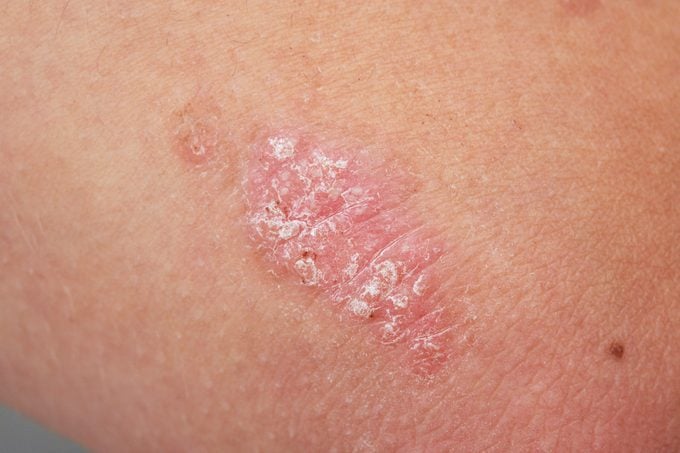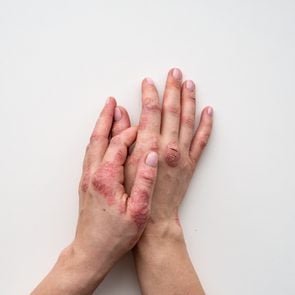7 Proven Treatments for Plaque Psoriasis
Updated: Jun. 17, 2021
This skin condition is the most common type of psoriasis, causing raised, scaly patches. Treatments range from light therapy to medication.
Topical treatments for plaque psoriasis
Plaque psoriasis is a skin disease that causes raised patches or plaques of skin usually on the scalp, knees, elbows, and lower back. It’s the most common type of psoriasis, according to the National Psoriasis Foundation. It’s important that you have a good skin care routine to take care of your psoriasis and a treatment plan in place.
If plaque psoriasis covers less than 10 percent of your body, it’s considered mild. In these cases, topical treatments tend to be the best bet, says Gary Goldenberg, MD, an assistant clinical professor of dermatology at Icahn School of Medicine at Mount Sinai in New York City. Steroids are among the most widely prescribed topical treatment for plaque psoriasis. The medications work by reducing the inflammation that fuels the condition. Some newer topicals such as Taclonex ointment and Enstilar foam combine a steroid (betamethasone) and vitamin D3 (calcipotriene); the combination slows the growth of skin cells; rapid turnover of skin cells is another aspect of psoriasis, and slowing growth helps thin the plaques. Vitamin A derivatives such as Tazorac also slow skin cell growth, as does Drithocreme (anthralin): This is a man-made version of the active substance in goa powder from the araroba tree; it helps reduce the rapid turnover of skin cells. Tar-based therapies can help in the same way.
Other topicals are available over-the-counter. Some contain salicylic acid, which helps remove the skin’s outer layer. Moisturizers are also effective as psoriasis tends to get worse when your skin is dry. You might also consider these expert-recommended shampoos for scalp psoriasis.

Phototherapy for plaque psoriasis
While light therapy has surprising benefits for those with seasonal affective disorder, it’s also used to treat plaque psoriasis. Ultraviolet rays—in measured doses—can slow the growth of affected skin cells. There are different forms of phototherapy: Some are administered in a doctor’s office, and you can do others at home. “Light therapy is an option and it can work very well, but you may need to come to the office three times a week, and there is a copay for each visit,” Dr. Goldenberg says. Another drawback, he points out: “Phototherapy likely doesn’t help with the overall inflammation of psoriasis that we know can increase the risk for heart disease and diabetes.”
Biologic drugs for plaque psoriasis
These medications target parts of the immune system to shut down inflammation, and they’re the mainstay of treatment for moderate to severe plaque psoriasis—typically defined as when more than 10 percent of your body surface is involved, Dr. Goldenberg says. There are a host of biologics that target different aspects of the immune system. The hope is that these agents also reduce the risks of some of the diseases that travel with psoriasis, including joint pain and heart disease. Biologics carry some risks: Users can be more susceptible to infections such as tuberculosis, Covid-19, and more.
Lasers for plaque psoriasis
An excimer laser is a treatment option for mild plaque psoriasis, says Philadelphia dermatologist Harold Farber, MD. It shoots high doses of ultraviolet B (UVB) light directly onto plaques to slow abnormal skin cell growth. “It works well when less than 10 percent of body surface area is involved in the plaque psoriasis,” he says. About two or three treatments per week are needed for maximum plaque-clearing effects. This laser is also one of the top treatments for scalp psoriasis.

Systemic drugs for plaque psoriasis
There are several non-biologic medications that can help treat plaque psoriasis. One, Otezla (apremilast), is extremely effective for moderate plaque psoriasis, Dr. Goldenberg says. It’s a pill—no injection necessary—that inhibits an enzyme linked to inflammation. Common side effects include diarrhea, nausea, and headache. All medications will work better if you steer clear of triggers, so make sure you avoid these seven foods that can make psoriasis worse.
Capsaicin for plaque psoriasis
When added to cream, capsaicin (the ingredient that gives chili peppers their kick) may help curb itching and inflammation of plaque psoriasis. “It’s good for localized plaques, but can be hard to smear all over the body,” Dr. Farber says. “Sometimes I will use it in conjunction with other things depending on the extent and severity of the psoriasis.” Expect some burning and stinging at first, he warns. “More work needs to be done on the role capsaicin in plaque psoriasis.”
Weight loss for plaque psoriasis
Psoriasis affects more than just the skin. A growing body of evidence links it to heart disease, diabetes, and some cancers and autoimmune diseases. Losing weight can help mitigate those risks; slimming down also helps improve the symptoms of psoriasis, a study in the Journal of Investigative Dermatology reports.




















